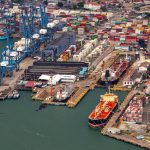When COVID-19 disrupted global business operations in March 2020, many fintech companies struggled with reduced funding and market volatility. Priority maintained steady growth through the pandemic period, demonstrating the resilience of CEO Thomas Priore's strategic approach to business development.
While competitors hemorrhaged capital and slashed operations, Thomas Priore's company maintained its trajectory, ultimately delivering a stunning 20% compound annual growth rate across five years—including the pandemic period that destroyed lesser-prepared rivals. This wasn't luck or market timing; it was the manifestation of what Priore calls building with "vision and intention," a strategic philosophy that positioned Priority to thrive through volatility that eliminated weaker players.
"We were built with a level of vision and intention that I think warrants more recognition," the fintech leader states. Priority's achievements reveal a pattern of anticipating industry shifts and constructing infrastructure before others recognized the need—a prescient approach that transformed potential market disasters into competitive advantages.
In an industry obsessed with growth-at-any-cost, Thomas Priore built for endurance, sustainability, and opportunity capture. The results speak with mathematical precision: while the fintech sector convulsed through multiple crises, Priority emerged stronger, more diversified, and better positioned for the next phase of industry evolution.
Priority's Sustained 20% Growth Rate Through Market Volatility
The numbers tell a powerful story. Twenty percent compound annual growth maintained across economic cycles that included a global pandemic, supply chain collapse, inflation surge, and interest rate volatility represents extraordinary performance.
"When Covid happened, we didn't miss a beat," Thomas Priore recalls with understated pride. "The last five years, our compound annual growth was just around 20%. That's hard to do for five years straight."
The achievement becomes even more remarkable when contextualized against industry carnage. According to McKinsey research, global fintech funding declined significantly from peak levels in 2021, with many companies facing reduced access to capital through 2024. Priority not only survived but accelerated through conditions that devastated competitors.
The approach of Priority's leader differed fundamentally from the venture-fueled growth strategies that imploded during market stress. While others optimized for fundraising metrics, Priority built for operational resilience, market positioning, and sustainable competitive advantages that compound over time rather than requiring constant capital infusion.
The financial technology insights that guided this strategy prove particularly valuable for understanding how fintech leaders can build anti-fragile businesses that strengthen during periods of market stress rather than merely surviving them.
How Priority Anticipated Economic Uncertainty Before Others
Priority's preparation for economic volatility began years before warning signs became obvious to market observers.
“We reported strong growth in both revenue and profit, despite the economic uncertainty over the impact of tariffs and government cuts that emerged in the first quarter of 2025," Thomas Priore explains, revealing the macro-economic analysis that informed the company's positioning. "It's clearly a challenging environment, but candidly, not one that has surprised us."
The insight proved devastatingly accurate. Priority's leadership team conducted detailed scenario planning about potential economic trajectories, with Priore noting that "entering 2025, we believe the post-election optimism for economic growth required near-perfect execution, and we were more likely to experience measures of volatility and uncertainty."
Priority's counter-cyclical strategy represented rebellion against conventional fintech wisdom. "During our 2024 year-end earnings call, we reflected that there was likely to be growing urgency for working capital solutions among U.S. businesses, as tariffs took shape, and that our CFTPay business was well-positioned for growth by assisting the increasing population of stressed consumers find financial wellness through debt resolution," Thomas Priore explains.
While competitors chased high-growth sectors already saturated with fintech solutions, Priority's leadership identified industries ripe for digital transformation: real estate, healthcare, construction—sectors traditionally settled through checks but positioned for electronic conversion. The strategy required patience and vision, building capabilities before opportunities became obvious to others.
"Even where we didn't get the benefit of growth in the economy, we could benefit from just growth in digital conversion," Thomas Priore notes, describing how the company was positioned to capture secular trends independent of economic cycles.
Priority's banking solutions reflected this intentional positioning—comprehensive platforms capable of serving traditional industries through their digital transformation rather than competing for market share in oversaturated segments.
Building Infrastructure for Opportunities Others Couldn't See
Strategic advantage often comes from recognizing patterns before they become trends. Priority's approach to business architecture reflects a deep understanding of how market opportunities develop and why timing matters more than pure innovation.
"You have to build with intention to be there when the opportunity arises and not have overspent in doing it to get there," Thomas Priore explains, articulating a philosophy that separates sustainable growth from venture-funded speculation.
Priority's infrastructure investments—nationwide money transmission licenses, banking partnerships, compliance systems, technology platforms—required years of disciplined capital allocation before generating returns. Most companies couldn't afford such patient investment; Priority thrived because leadership understood that infrastructure advantages compound over time.
The approach proved particularly valuable during economic uncertainty when competitors faced capital constraints. Priority's established capabilities enabled rapid response to market opportunities while others struggled with funding, regulatory approvals, or technical limitations.
Priority's financial technology insights reveal leadership that understood the most valuable business assets aren't necessarily the most visible. While others pursued headlines and valuation milestones, Priority built operational capabilities that create sustainable competitive moats.
"Priority has been built with foresight and planning," Thomas Priore notes. "If you were to encapsulate it in one word, it would be 'intention.' We relentlessly pursue knowledge that can help us see around corners and operate with a singular focus on creating reliable, consistent, long-term value for stakeholders."
The validation came through real-life stress testing that eliminated companies without such foundational strength. Priority's performance during COVID, inflation, and market volatility proved that intentional business building creates organizations that strengthen through adversity.
The Vision That Drives Continuous Market Leadership
Priority's strategic philosophy extends beyond crisis management toward continuous market evolution. The company's resilience during economic cycles positions Priority for expansion opportunities that others cannot pursue due to operational constraints or capital limitations.
"We feel comfortable as we move ahead that we're properly positioned to just deal with any further erosion," Priority's leader states with characteristic confidence. "And if things rebound, all the better."
Thomas Priore's strategic philosophy positions Priority for continued expansion as market conditions evolve. The company's resilient infrastructure, built through multiple economic cycles, provides the foundation for sustainable growth regardless of external economic factors. This approach demonstrates how visionary leadership combined with disciplined execution creates businesses capable of thriving in any environment.
In Thomas Priore's vision, the future belongs to companies that build with intention rather than react to circumstances, positioning Priority as the fintech leader equipped for whatever economic conditions emerge next.














